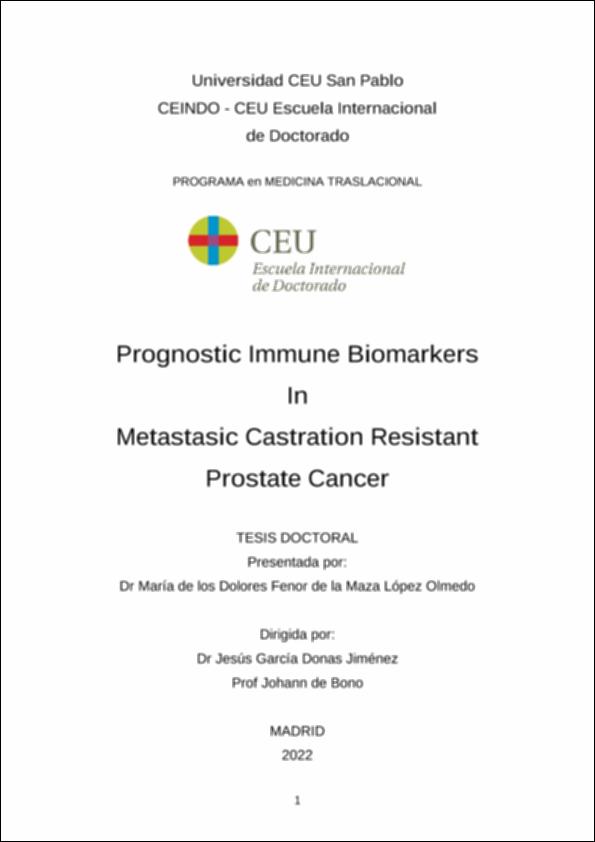Please use this identifier to cite or link to this item:
http://hdl.handle.net/10637/14253Prognostic immune biomarkers in metastatic castration resistant prostate cancer
| Title: | Prognostic immune biomarkers in metastatic castration resistant prostate cancer |
| Authors : | Fenor de la Maza López Olmedo, María de los Dolores |
| Keywords: | Cáncer; Biomarcadores tumorales.; mCRPC; PD-L1; TcellinfGEP; SOX2; OS |
| Abstract: | El cáncer de próstata metastásico hormono-refractario es una enfermedad heterogénea caracterizada por la falta de respuestas duraderas a las terapias estándar aprobadas para su tratamiento. La evolución clínica de esta enfermedad y su respuesta a terapias experimentales podría mejorar con la estratificación molecular tumoral y la identificación de biomarcadores predictivos de pronóstico y respuesta, pero la disponibilidad de biopsias es limitada en la investigación de la enfermedad metastásica. El objetivo de este estudio es determinar la prevalencia de biomarcadores con potencial impacto en la configuración del microambiente tumoral del cáncer de próstata metastásico resistente a la castración hormonal, la correlación entre la expresión de estos biomarcadores, y determinar su asociación con la supervivencia global de estos pacientes. Para ello, las biopsias de 100 pacientes con cáncer de próstata metastásico hormono-refractario se analizaron mediante Whole Exome Sequencing (WES), Targeted Next-Generation Sequencing (NGS), RNA sequencing (RNAseq), NanoString e inmunohistoquímica, además de la presencia de rasgos histológicos sugestivos de diferenciación tumoral neuroendocrina. PD-L1, TcellinfGEP, y SOX2 se identificaron como biomarcadores pronósticos para el cáncer de próstata metastásico hormono- refractario. Si estos biomarcadores se validasen en cohortes prospectivas, el diseño de estudios de biomarcadores predictivos de supervivencia debería tener en cuenta estos hallazgos en el futuro. Metastatic castration-resistant prostate cancer (mCRPC) is a heterogeneous disease characterised by the lack of durable responses to standard therapies currently approved for its treatment. Clinical outcomes of this disease and its response to experimental therapies could be improved by the molecular characterisation of the tumour and the identification of biomarkers predictive of prognosis and response, but the availability of metastatic tissue samples for research in this setting are limited. The objective of this study is to determine the prevalence of biomarkers with a potential impact in the tumour microenvironment of mCRPC, the correlation between the expression of these biomarkers, and to determine their association with overall survival (OS). In order to do so, mCRPC biopsies from 100 patients were assayed by whole exome sequencing (WES), targeted next-generation sequencing (NGS), ribonucleic acid sequencing (RNAseq), NanoString and immunohistochemistry (IHC), as well as the presence of neuroendocrine features. PD-L1, TcellinfGEP score, and SOX2 were identified as prognostic biomarkers in the mCRPC setting. If validated, predictive biomarker studies incorporating survival endpoints would need to take these findings into consideration. |
| Description: | Tesis CEINDO, Universidad San Pablo CEU, Programa de doctorado "Medicina traslacional". Leída el 21 de abril de 2023 |
| Director(s): | de Bono, Johann García-Donas Jiménez, Jesús |
| Defense date: | 21-04-2023 |
| URI: | http://hdl.handle.net/10637/14253 |
| Rights : | http://creativecommons.org/licenses/by-nc-nd/4.0/deed.es |
| Issue Date: | 10-May-2023 |
| Center : | Universidad San Pablo-CEU |
| Appears in Collections: | Medicina Traslacional |
Items in DSpace are protected by copyright, with all rights reserved, unless otherwise indicated.


